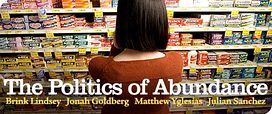Brink raises the issue of whether or not a “European-style social democracy” is likely to emerge in the United States. In my view it depends on what one means. As he notes, contemporary European social democrats have substantially reined in their ambitions, privatizing state-owned firms and the like. It seems exceedingly unlikely that the U.S. is going to nationalize the mines and everyone seems to agree that airline regulation of the old school is gone for good. Nor does America seem likely to me to adopt German- or French-style labor market regulations, less because the fondest dreams of progressive America are likely to go unfulfilled than simply because there’s fairly little support for such ideas even in America’s progressive community.
What I do think is likely is that the trend toward increasing government involvement in the provision and finance of health care will continue. Similarly with the trend toward government involvement in the provision and finance of preschool and day care. And, again, with the trend toward increasing federal involvement in the finance of primary and secondary education (this last perhaps paired with a more libertarian evolution of the actual administration of schools). These would be moves in the direction of social democracy, but also moves that are very much in accordance with Lindsey’s vision of happy, freedom-seeking postmoderns, and they seem to me to reflect things that voters want.

